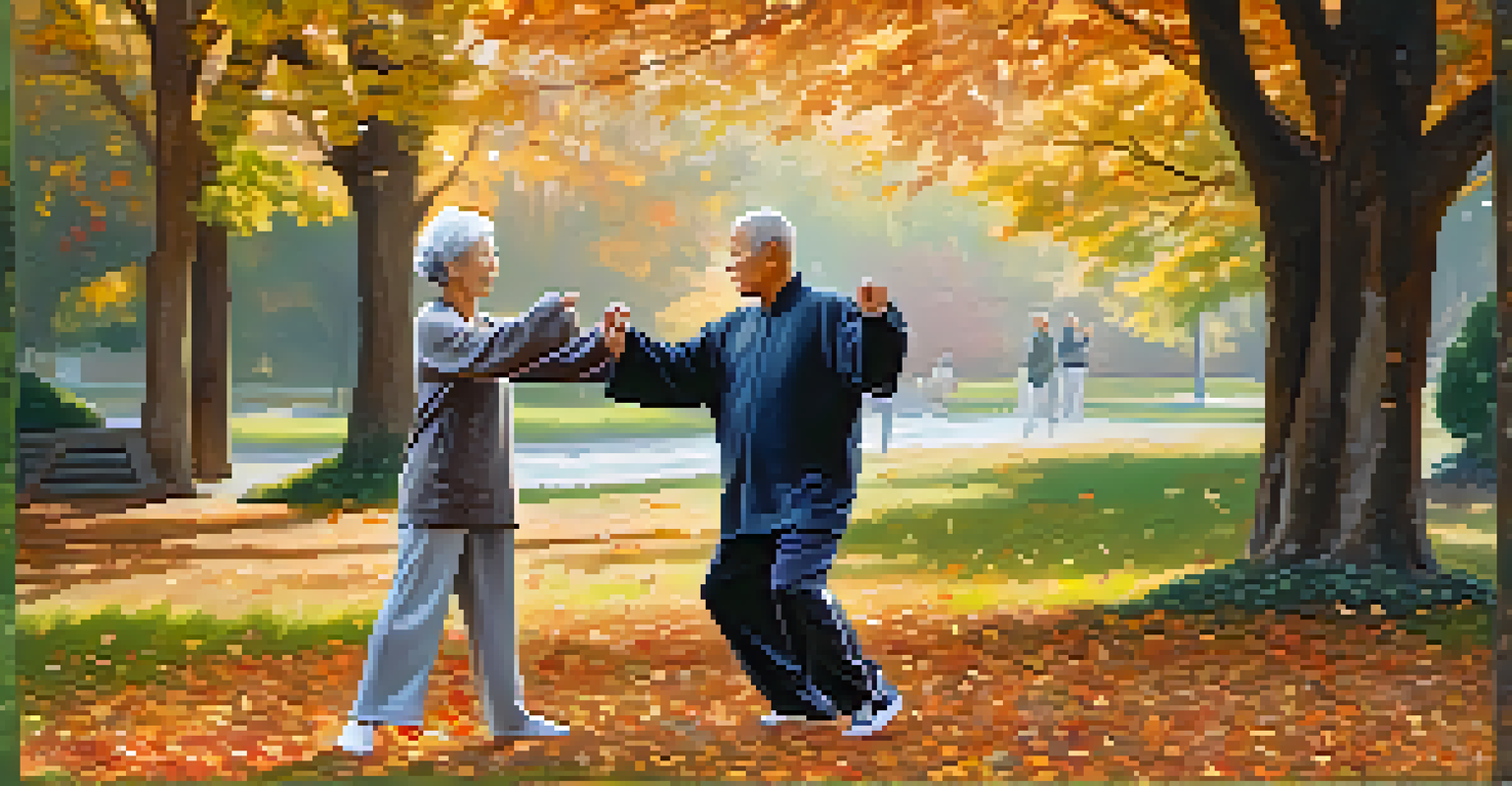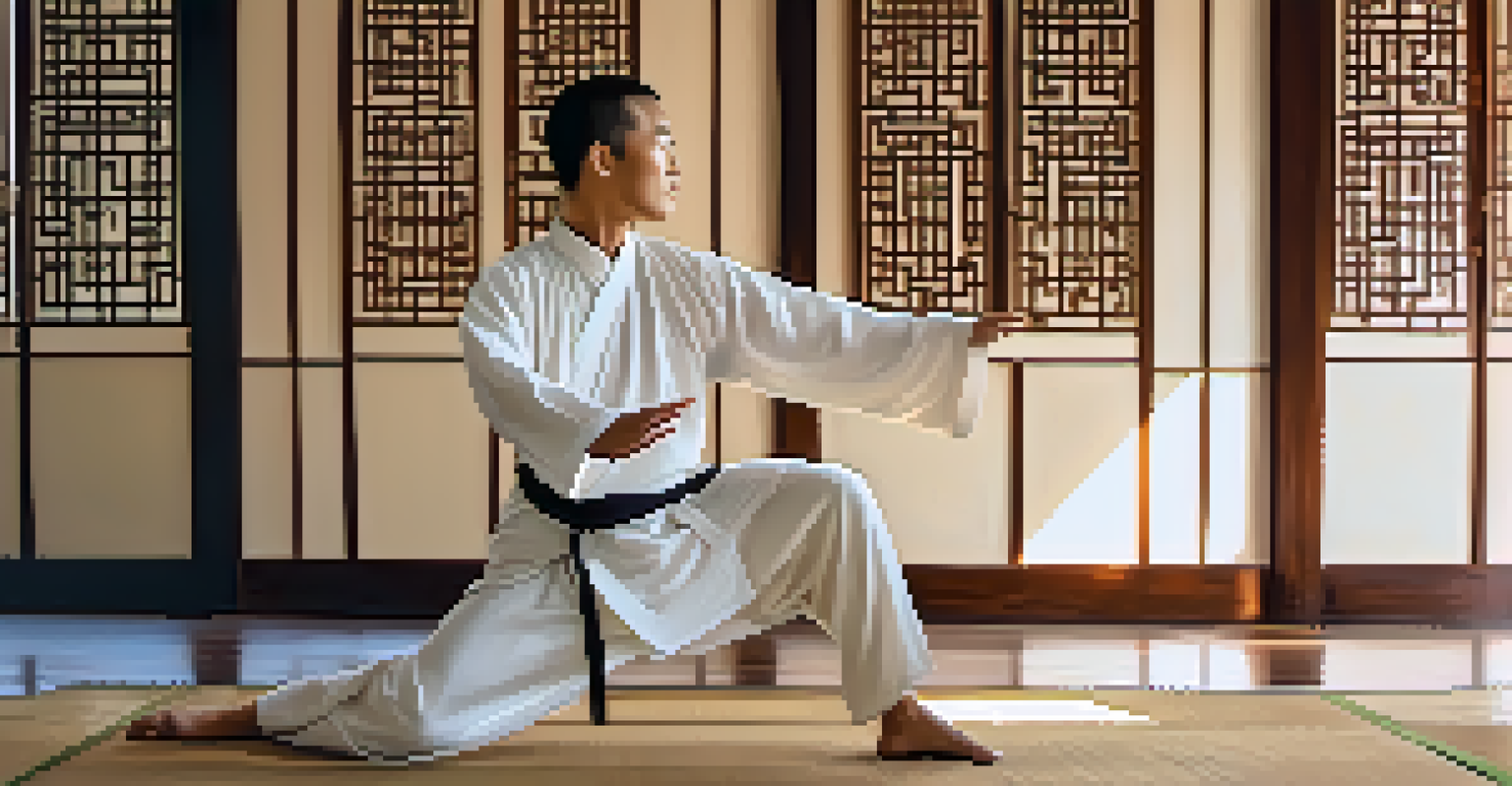Tai Chi: A Non-Traditional Therapy for Naturopathic Health

What is Tai Chi and Its Historical Roots?
Tai Chi, often described as 'meditation in motion,' is a traditional Chinese martial art that emphasizes slow, deliberate movements and deep breathing. Its origins can be traced back to ancient China, where it was practiced not only for self-defense but also for promoting health and well-being. This gentle form of exercise has evolved over centuries and is now recognized globally as a holistic practice.
Tai Chi is a form of exercise that helps to build strength, flexibility, and balance, all while promoting relaxation and mental clarity.
While many view Tai Chi as a physical activity, its roots are deeply intertwined with Chinese philosophy, particularly concepts like yin and yang. These principles highlight the balance between opposing forces, which is reflected in the fluid movements of Tai Chi. This balance is not just physical; it extends to mental and emotional well-being, making Tai Chi a comprehensive practice.
Today, Tai Chi is celebrated for its ability to enhance physical fitness while also fostering a sense of calm and mental clarity. It has transitioned from a martial art to a therapeutic exercise, appealing to people of all ages, particularly those seeking alternatives to conventional therapies.
Benefits of Tai Chi for Naturopathic Health
Tai Chi offers a myriad of health benefits, making it a popular choice in naturopathic health circles. Research has shown that regular practice can improve balance, flexibility, and strength, which are crucial for overall physical health. Furthermore, it is particularly beneficial for older adults, helping to prevent falls and enhance mobility.

Beyond physical benefits, Tai Chi is also known for its positive impact on mental health. The meditative aspect of the practice promotes relaxation and stress reduction, which are essential in today’s fast-paced world. Participants often report lower levels of anxiety and depression, attributing this improvement to the mindful nature of the movements.
Tai Chi: A Holistic Practice
Tai Chi combines slow movements with mindfulness, promoting physical health and emotional well-being.
Additionally, Tai Chi has been linked to better sleep quality and enhanced immune function. By engaging in this low-impact exercise, individuals can support their body’s natural healing processes, aligning perfectly with the principles of naturopathic health, which emphasize the body’s innate ability to heal itself.
How Tai Chi Differs from Traditional Exercise
Unlike traditional forms of exercise that may focus on intense cardiovascular workouts or heavy lifting, Tai Chi emphasizes slow, controlled movements. This approach allows practitioners to focus on their breath and body alignment, making it accessible even for those with physical limitations. The gentle nature of Tai Chi means it can be practiced by anyone, regardless of age or fitness level.
The essence of Tai Chi is to be in harmony with oneself and the world, allowing the body and mind to flow together seamlessly.
Moreover, Tai Chi integrates mindfulness into its practice, encouraging participants to be fully present and engaged. This contrasts sharply with many traditional workouts, where the focus may solely be on achieving specific fitness goals. By fostering a deeper connection between mind and body, Tai Chi creates a holistic experience that enhances overall well-being.
This unique blend of physical activity and mindfulness makes Tai Chi not just a form of exercise but a lifestyle choice. It encourages individuals to cultivate awareness in their daily lives, promoting healthier habits beyond the practice itself.
Incorporating Tai Chi into Daily Life
Incorporating Tai Chi into your daily routine doesn't require a complete lifestyle overhaul. Many practitioners suggest starting with just 10-15 minutes a day, gradually increasing as you become more comfortable with the movements. Simple routines can be practiced at home, in the park, or even in a quiet office space during breaks.
Joining a local Tai Chi class can also provide structure and guidance, allowing you to connect with a community of like-minded individuals. These classes often cater to various skill levels, making it easy to find a group that fits your needs. Additionally, many online resources and videos offer tutorials for those who prefer practicing at home.
Health Benefits of Tai Chi
Regular practice can enhance balance, flexibility, and mental clarity while reducing stress and improving sleep quality.
As you integrate Tai Chi into your routine, it’s essential to approach it with an open mind and a willingness to learn. Over time, you may find that the practice not only improves your physical abilities but also enhances your emotional resilience and mental clarity.
Common Misconceptions About Tai Chi
One common misconception about Tai Chi is that it's only for older adults or those with health issues. While it certainly benefits these groups, people of all ages can enjoy and gain from the practice. In fact, many younger individuals participate in Tai Chi for stress relief, flexibility, and overall wellness, helping to dispel the myth that it’s solely for seniors.
Another misunderstanding is that Tai Chi is too easy or not a 'real' workout. This couldn’t be further from the truth! While the movements are gentle, they require focus and strength, offering an effective workout that builds endurance and promotes relaxation. The slow pace allows for a deeper engagement with the body, making every movement intentional and beneficial.
Finally, some may think that Tai Chi is purely a physical practice, overlooking its mental and spiritual dimensions. The integration of mindfulness and breath work into Tai Chi is what sets it apart, providing a holistic approach to health that nurtures the body, mind, and spirit.
Scientific Research Supporting Tai Chi
Numerous studies have explored the health benefits of Tai Chi, providing a solid foundation for its use in naturopathic health. Research has demonstrated that regular practice can reduce chronic pain, improve balance, and enhance cardiovascular health. These findings bolster Tai Chi's reputation as an effective therapeutic exercise for a range of health issues.
Furthermore, studies have shown that Tai Chi can improve mental health outcomes. For example, participants in studies often report reductions in symptoms of anxiety and depression, as well as improvements in mood and overall quality of life. These outcomes align with the holistic principles of naturopathic health, which emphasize treating the whole person.
Accessible for All Ages
Tai Chi is suitable for individuals of all ages and fitness levels, debunking myths about it being only for seniors.
As more research emerges, Tai Chi continues to gain recognition within the medical community, leading to its integration into various rehabilitation programs. This scientific backing reinforces the idea that Tai Chi is not just a wellness trend, but a legitimate practice with meaningful health benefits.
Getting Started with Tai Chi: Tips for Beginners
If you’re considering trying Tai Chi, the first step is to find a class or instructor that resonates with you. Look for classes that cater to beginners and emphasize a welcoming environment. Many communities offer free or low-cost introductory classes, making it easy to explore this practice without a significant commitment.
Once you’ve found a class, come prepared with an open mind and a willingness to learn. Tai Chi may feel different from other forms of exercise, but embracing the process is key to reaping its benefits. Remember, it’s not about perfection but about enjoying the journey and discovering what feels right for you.

Lastly, practice patience. Like any new skill, Tai Chi takes time to master. Regular practice will help you feel more comfortable with the movements, and over time, you’ll likely discover a sense of peace and balance that enhances your overall well-being.